Welcome to my blog
Grow & Scale A Business That Will Set You Free
Excuses Are Good!
Excuses are good; really good. Because, if you’ve got a plausible excuse, then you’re safe… you don’t need to do anything; you don’t need to risk anything.
If you want to do, be or have something more for yourself; if you’d like your life to be different; if you’d like your health to be better; or if you’d like a job that makes you happy; or a relationship that makes your heart soar; and you’ve got an excuse… well, then, nothing really is required of you. 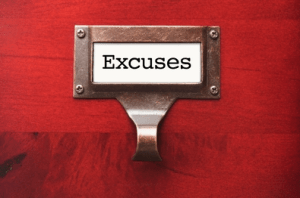
You can just sit tight. Stay comfy. And let the clock run out.
Or not.
The Biggies
Here are the excuses I hear most frequently from clients:
- It’s not the right time. “I’m too old, too young, too fat, too out of shape. I need to save up some more money; I need to wait for the promotion or partnership or bonus; I need to wait until the kids are out of school; I need to wait until my partner retires or I retire; or… .”
The truth is: It’s NEVER the right time. There are ALWAYS obstacles. There are ALWAYS hurdles to jump; there are ALWAYS challenges to overcome.
Now is the only time you have. Tomorrow is promised to do one. Goethe says, “What you can do, or dream you can do, begin it; Boldness has genius, power and magic in it.”
- I could never do that. I’m not brave enough; fast enough; strong enough; fit enough; smart enough; wealthy enough; creative enough; ___________ enough.
I could never do that. I’m not enough.
It’s one of our core insecurities as human beings: That I’m not enough.
It’s why we strive. It’s why we have the Sistine Chapel and rocket ships and the computer and smartphones… because we achieve, we strive… because we forever strive… for more. But the worry that we’re not enough also stops us short; holds us back.
But we’re already enough. All we need is within us already.
Everyone starts from the same place. A Mozart, a Picasso, a Marconi; and some even start from hugely disadvantaged places: a Lincoln, a Mandela, an Oprah.
No matter where you start, you have enough – you are enough – to go the distance.
- It will take too long. It will take 4 years for the degree; 7 years for the residency; 6 months to train for the race; a year to lose the weight; 3 to write the book; and who knows how long to find the ‘right one.’
So what? Who cares? The clock is ticking. The time will pass; whether you take the next step; or not.
It may well take you three years to launch your new business; but the three years will come and go even if you never launch.
Greatness takes time. The overnight success has spent many a sleepless overnight. And while maybe you won’t need 10,000 hours to sharpen your skills, you still need to put in the effort.
Opportunity often disguises itself as work; and work worth doing – legacy work, generational work, world-changing work – often takes a long time.
- It’s too big; too hard. It’s complicated, confusing, overwhelming, I can’t figure it out. I don’t know where to research it; I don’t know who to talk to; I don’t know what to do next.
Even highly successful, highly accomplished professionals labor with this excuse. The more expert we become in a particular area, the more daunting it is to venture into a new one. We like the familiarity of our own turf.
And even highly successful folks have ‘blind spots.’ They may excel in the business life and struggle in their relationships; their finances might be stellar and their health in the toilet.
Too, we live in a culture of overwhelm. There’s so much flying at us all the time. We suffer from information overload. We resist wanting to take in more.
But what we need to remember is that every journey starts with a single step. Every ultra I’ve run, every mountain I’ve climbed… no matter how long or how big gets finished by taking one step… and then the next.
We want to see the entire way. But we don’t need to. “Take the first step in faith,” Martin Luther King, Jr. said. “You don’t need to see the whole staircase; just take the first step.”
In every endeavor, every business venture, every fitness goal, every financial objective, every marketing campaign, every piece of research, it’s just one step at a time.
And the hardest one is the first one. So just take it!
- It’s too risky. I don’t want to fail; I don’t want to lose my job; I don’t want to lose money; I don’t want to get hurt in another relationship; I don’t want to get injured. It’s too dangerous.
This is the most pernicious excuse of all because it seems to make so much sense. Why take unnecessary risks… why put yourself in harm’s way?
Guess what? Life is dangerous. None of us gets out alive.
I have a buddy who has been on Mt. Everest twice; summitted once. He shattered his leg cleaning out the leaves from the gutters on his one-story house.
We like to believe in stability; in constancy. But the only thing that is constant, the only sure thing is that things will change.
Businesses collapse, partnerships fail, marriages come unraveled, layoffs happen, people get sick, markets crash. And as much as we like to maintain an illusion of control, we really don’t have very much at all.
Our comfort zones are called comfort zones because, well, they’re pretty damn comfy. But what’s true is that the magic happens just beyond. Our greatest breakthroughs… our very best lives… are just outside that place of comfort. Life rewards those who risk.
What’s Next?
So excuses are good; in fact, they’re great… if you want to stay stuck. Not so much if you want a big life. The stories we tell ourselves are just that: stories. It’s as easy to make up a small story as it is a grand one.
Grand is better.
What are your favorite go-to excuses? And what will you do now?
Be A Control Freak
Ok people, it’s done.
Summer’s over. The vacation’s behind you. No more lazy lunches. No more casual Fridays.
It’s time to put away the Dockers… and the swimmies. It’s time to get back to it.
September’s here. Time to get busy; time to get serious.
No more leisure, no more playtime.
It’s time for work.
Uhhh, wait a minute: I object. I don’t want to give up playtime!
It is a busy time of year. But perhaps we can take some of summer with us?
In summer, it seems, time is more expansive; the rules more flexible; the boundaries softer.
And then September comes and – maybe it’s a holdover from going back to school – it seems like the time for fun is over.
We move back into our busy lives, our schedules chock full, shuttling around the kids, out to soccer games and swim practices, with evening meetings, volunteer activities and board commitments.
Many of my coaching clients feel like they’re moving back into the forest fire armed only with their squirt guns; their lives turned into an out-of-control carnival game of whack-a-mole. Reacting endlessly, and breathlessly, to the urgent.
Never really getting to what is really, truly the important in their lives.
And summer slips silently into the rear view mirror with perhaps some vague hope for respite and reprieve on some distant unencumbered weekend… or maybe in February on that “vacation.”
There is a different way.
But it requires that you become a control freak.
That’s right, a control freak: someone who takes control of their lives!
No one else is gonna do it for you. You’ve gotta do it for yourself.
And this means that you need a bit of courage and audacity.
I know. I live it too. Bombarded by unceasing demands and expectations in every area of our lives. Inundated by inputs. Juggling multiple modalities of communication. Over committed and suffused with the anxiety of dropping the ball.
But here’s the truth: the in-box will always be full. None of us will ever get it all done. If you died tomorrow, you’d be replaced.
So why not pay attention to what truly matters?
People ask me how it is that I take so much time away traveling and adventuring. The answer: it’s a choice.
Last year, I took 13 weeks off. There were no disasters. No one missed me. The world went on.
And, damn, it was fun.
So here are some practices to consider before September gets too crazy:
- Decide what really, really matters to you. Spend time on that. Get rid of the rest.
- Get really good at saying no; if you find yourself saying you “should” do something, you probably shouldn’t.
- Carve out time for yourself – every single day. No one else is going to do it for you.
- Get up an hour early and enjoy the quiet. Use it to read and write and meditate and create.
- Plan your weeks; and plan each day; actually schedule in the time for the things that matter most to you.
- Turn off the TV at night and focus on the life you really want.
Here’s the scoop: at the end of our lives, no one is going to wish they spent more time in the office, billed more hours, sold more product, sat on more boards, went to more PTO meetings, or volunteered for more committees. It won’t matter whether you went to one more network group, whether your Facebook status was up to date, or whether you were well LinkedIn. What will matter will be the experiences you have had, the love you have shared, the lives you have touched.
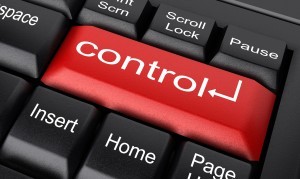
What will matter will be whether you showed up in each and every moment to know the fullness and the joy of your life.
What will matter is whether you have lived without regret.
For that to happen, you’ll need to become a control freak.
___________________________________________________
Perhaps this is the right time to consider whether coaching might be a benefit for you in your business and/or your life. Email me. Let’s talk.
Utter Failure
Not for lack of effort. Or determination. Or resolve.
You and I have tried.
Presidents and kings have tried.
Ambassadors and delegations too.
No one has succeeded. All have failed.
It won’t sit at the table. It won’t communicate. It won’t negotiate.
It ravages.
It’s ruthless. Relentless. Rogue.
Time.
We think we can manage it; grab hold of it; allocate it; defer it.
We actually think we can get more of it. Or get it back!
But we can’t.
It slides through our hands like the wind.
We think there are things like ‘quality’ time and ‘family’ time and ‘me’ time. 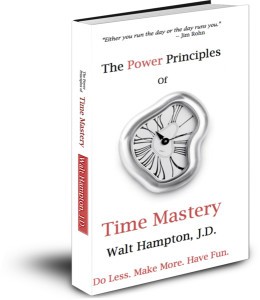
But there’s not.
Time is just time.
Time does not discriminate.
Time does not care.
Time does not wait.
Time does what it wants.
Time ignores us all.
Any deal we try to make, any bargain we try to strike, is an illusion we create to fool ourselves.
The bad news is that our time will run out.
The good news is that you have all of the time that there is.
What you do with it is up to you.
This fall, I am launching a new keynote, based on my book The Power Principles of Time Mastery: Do Less, Make More, Have Fun. Here’s a preview:
I help organizations, business professionals and their teams increase their productivity, sharpen their focus and master their time.
If you know of an audience that would benefit from this keynote, please email me. If you have the time.
___________________________________________________________________
For booking and availability: https://www.walthampton.com/speaker-walthampton/
Sit There. Do Nothing.
What do the Seattle Seahawk players and the managers at Aetna Health Insurance have in common with the Dalai Lama?
They meditate.
Really.
They sit on cushions, close their eyes and go “Om.”
Why, you might ask, would burly football players and corporate execs bother?
Because they’ve discovered the power of mindfulness.
This is not some new fad. The ideas of meditation and mindfulness have been around since before the time of Siddhārtha Gautama, Shakyamuni a/k/a the Buddha, more than 500 years before the birth of Christ. What is new is finally a mainstream recognition that these ancient principles have a powerful impact on the way we live every day of our lives… and the way we conduct our businesses.
Culturally, we’re told that in order to get ahead, we need to work longer and harder and faster; we’re taught that busy is good; that faster is stronger; and that the more that we can do and be and accomplish, the more successful we will be. (All of which is bullshit.)
Part of this, of course, has come as a ‘gift’ of the technological revolution. With computers and laptops and tablets, we are (we think) capable of productivity beyond anything the Buddha could have comprehended. But here’s the rub: We’re not built like computers; we don’t have the capacity to be ‘always on;’ and despite vehement beliefs to the contrary, we can’t focus on multiple things at the same time. We just can’t.
We work in pulses. Most of us are not capable really of more than 5 high-quality hours of work a day on any given objective. We are scientifically incapable of multi-tasking. And we need our sleep.
And, in order to be truly successful, we need to be mindful; we need to slow down and get clear.
Meditation and mindfulness have been shown, though countless peer-reviewed studies, to dramatically improve:
➢ Cognition
➢ Attention
➢ Focus
➢ Memory
➢ Emotional wellness, and
➢ Physical health.
And at the same time, to significantly decrease:
➢ Stress
➢ Symptoms of depression, and
➢ The sense of always being scattered and distracted.
All of which, of course, leads to deeper presence, keener engagement, enhanced mastery, … and yes, greater productivity and profit.
Now, I can teach you all of the intricacies of meditation and mindfulness… I have been a Vipassana practitioner for 20 years… and the benefits have been staggering. But intricacies are unnecessary to get started. All you need to do is step back, step out… and get quiet. A regular 5 to 10 minutes a day can shift up your entire game. 
Close your eyes and breath. It’s that simple.
So convinced of the compelling science and the significant benefits, Mark Bertolini, Aetna’s chief executive, incorporated mindfulness and meditation into his corporate wellness program. And the Seattle Seahawks, to improve the emotional health of their players, brought in Pete Carroll to teach them to get quiet and focus their attention.
The Dalai Lama, of course, had an earlier heads up on all of this.
So whadda think? This is a pretty simple success strategy. If doing less would get you more, wouldn’t it be worth a try?
Space Exploration
I’ve been puttering in my garden. I love my garden. But I find puttering to be a challenge.
You see, I’m a big believer in action: Doing, achieving, accomplishing; moving like a shark lest I perish from inertia.
Steeped, as I am, in the cultural paradigm that, in order to succeed, I need to work longer, harder, faster, it is difficult for me to slow down.
Puttering sometimes seems aimless; pointless; wasteful.
But it’s not.
By puttering, I open up space for myself. I allow my mind to relax. I give myself the opportunity to think, reflect, create… and be.
Just be.
Every business leader we consult with, every professional we coach wants more time; they want – they yearn – for space.
The greatest crisis of our age is not terror in the world; it is the terror that we allow within ourselves.
The greatest crisis of our age is not that we don’t have enough, but that we have too much: too much information; too much noise; too much stimulation; too much to do.
The greatest crisis of our age is that we have lost touch with that that place of quiet, that still point within us.
We’ve lost the capacity to sit still, to be still, to know the beauty and the grandeur of the here and now.
We’ve lost the capacity to be: To just be.
When we give ourselves the gift of quiet, when we open up that space, our sense of possibility expands. We see the opportunities that we miss when we are racing to that imaginary finish line.
When we allow our minds – and our bodies – to relax – ideas flourish, insight lights, we create the ground for moments of “ah-ha.”
Commander Mark Divine, author of The Way of the Seal, teaches that we need the power of silence in order “to set the conditions to win.”
“Silence creates the space for you to think and thus see reality more clearly.”
“If you’ve ever noticed how good you feel after coming out of nature after an extended stay without your cell phone and laptop,” writes Divine, “here’s the reason why: It’s because you’ve slowed down enough to quiet your outer mind, allowing your inner wisdom to poke it’s head out a bit.”
And it is that inner wisdom that truly sets us apart; that allows us to excel and truly succeed at extraordinary levels.
Habit 7 in Stephen Covey’s celebrated business classic, The 7 Habits of Highly Effective People is Sharpen the Saw. “Sharpen the Saw means preserving and enhancing the greatest asset you have—you,” Covey said. 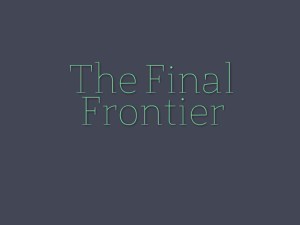
Self care, self-renewal.
Opening up space.
Puttering.
What can you do right now to create that space… for you?
DOWNLOAD your FREE BOOK!
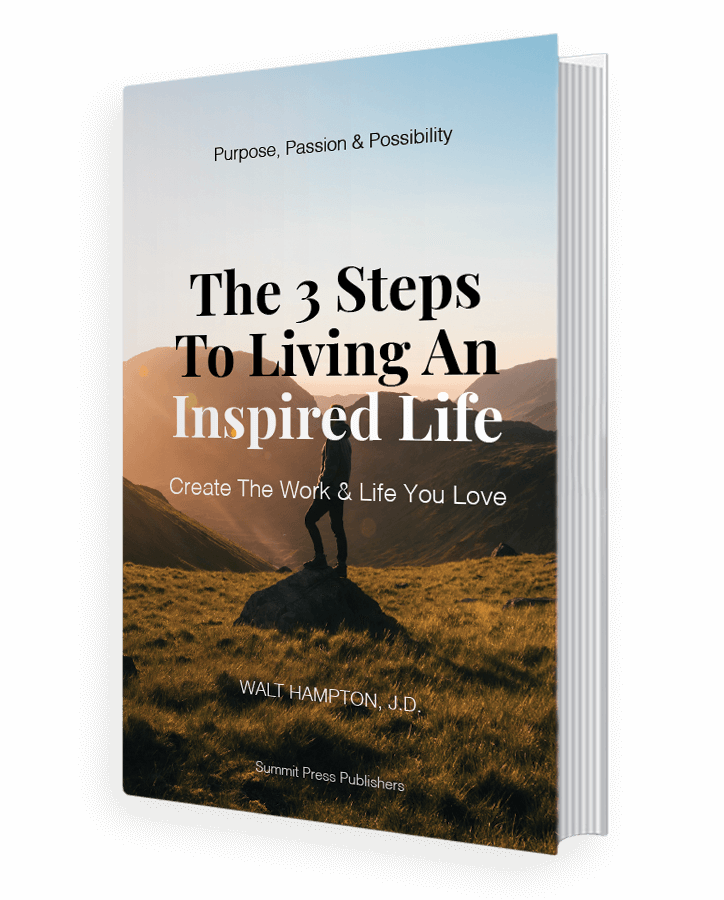
DOWNLOAD Your Free E-Book NOW! Click Below And Get Going!
Click below for your copy of Journeys!
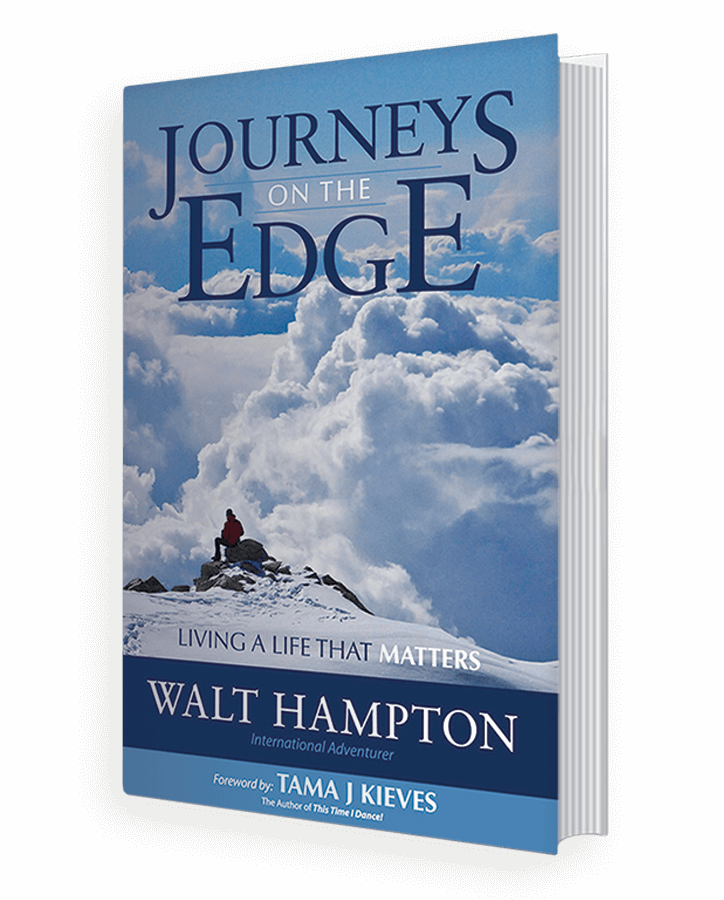
You’ll Get A Signed Copy!
Click on the button for your copy of my brand new book “The power principles of time mastery!”
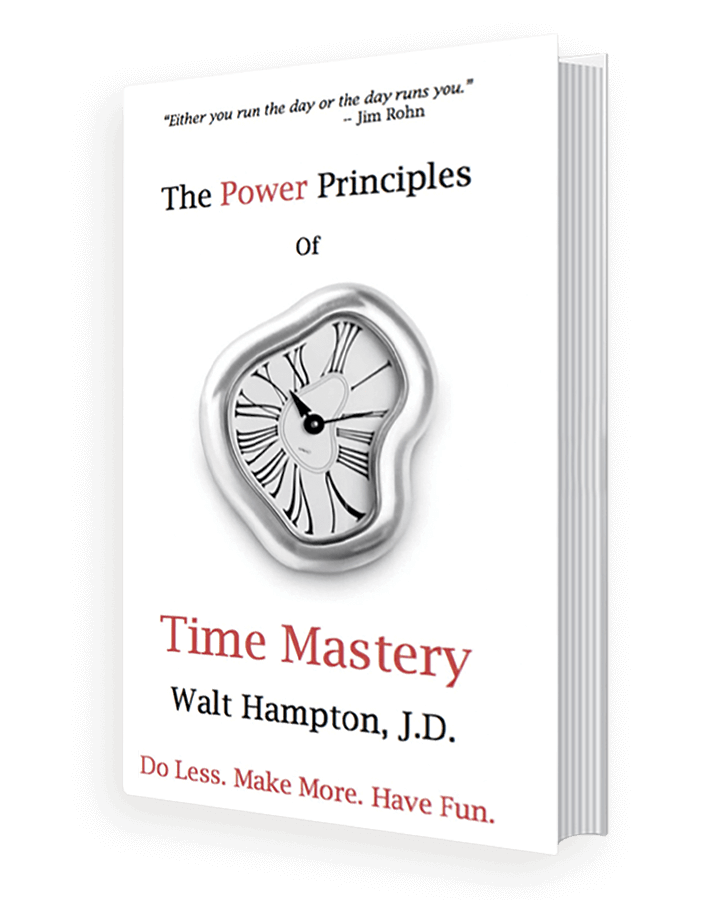
You’ll Get A Signed Copy!
Categories
Adventure
Finding The Way
Journeys
Leadership
Success
Ultra Training
